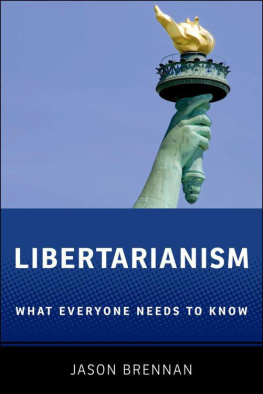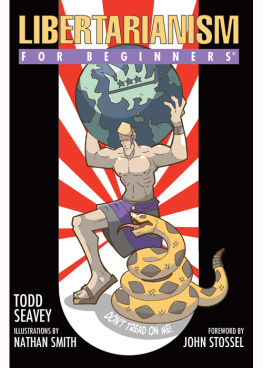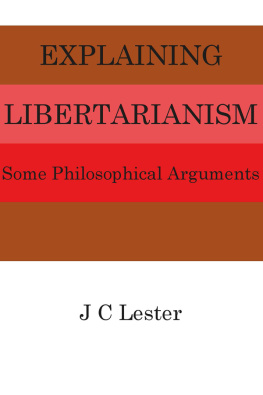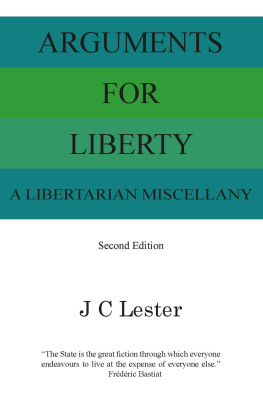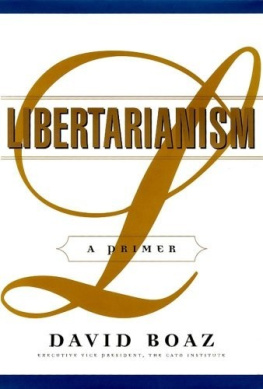LIBERTARIANISM
WHAT EVERYONE NEEDS TO KNOW
LIBERTARIANISM
WHAT EVERYONE NEEDS TO KNOW
JASON BRENNAN


Oxford University Press is a department of the University of Oxford.
It furthers the Universitys objective of excellence in research, scholarship, and education by publishing worldwide.
Oxford New York
Auckland Cape Town Dar es Salaam Hong Kong Karachi
Kuala Lumpur Madrid Melbourne Mexico City Nairobi
New Delhi Shanghai Taipei Toronto
With offices in
Argentina Austria Brazil Chile Czech Republic France Greece
Guatemala Hungary Italy Japan Poland Portugal Singapore
South Korea Switzerland Thailand Turkey Ukraine Vietnam
Oxford is a registered trademark of Oxford University Press in the UK and certain other countries.
Published in the United States of America by
Oxford University Press
198 Madison Avenue, New York, NY 10016
Oxford University Press 2012
All rights reserved. No part of this publication may be reproduced, stored in a retrieval system, or transmitted, in any form or by any means, without the prior permission in writing of Oxford University Press, or as expressly permitted by law, by license, or under terms agreed with the appropriate reproduction rights organization. Inquiries concerning reproduction outside the scope of the above should be sent to the Rights Department, Oxford University Press, at the address above.
You must not circulate this work in any other form and you must impose this same condition on any acquirer.
Library of Congress Cataloging-in-Publication Data
Brennan, Jason, author.
Libertarianism : what everyone needs to know / Jason Brennan.
pages cm
Includes bibliographical references and index.
ISBN 9780199933914 (pbk.) ISBN 9780199933891 (hardback)
1. LibertarianismUnited States. 2. United StatesPolitics and
government. I. Title.
JC599.U5B675 2012
320.512dc23
2012020049
ISBN 9780199933914
ISBN 9780199933891
1 3 5 7 9 8 6 4 2
Printed in the United States of America on acid-free paper
CONTENTS
INTRODUCTION
Libertarians believe that so long as we do not violate others rights, we should each be free to live as we choose. To respect one another as equal human beings, we must not force people to serve society, each other, or even themselves.
Critics of libertarianism worry that allowing people so much freedom would produce bad consequences. Critics say, sure, some freedom is good, but we also need to guarantee good results. We need government to guarantee good culture, scientific progress, and economic prosperity.
Libertarians agree that freedom does not guarantee good results. If people are free to choose for themselves, many will make bad choices. Still, libertarians say, nothing guarantees good results, so guarantees are beside the point. Liberty may not guarantee good results, but as a matter of fact it delivers good results.
These are intriguing ideas, whether they are true or false.
I first encountered libertarian ideas in a high school economics class. My teacher, Mr. Lee, suggested I read Henry Hazlitts Economics in One Lesson. It transformed me.
Hazlitt taught me that when evaluating policies, you must see past peoples good intentions and look instead at results. He taught me to view politics without romance.
Hazlitts one lesson is simple. When assessing a proposed policy, he says, do not just examine its immediate effects on the intended beneficiaries. Instead, he advises us, examine both its short-term and long-term consequences on all affected groups.
Hazlitts lesson is itself a modern version of Frdric Bastiats What Is Seen and What Is Not Seen. Bastiat condenses political economy to one lesson as well. He says:
There is only one difference between a bad economist and a good one: the bad economist confines himself to the visible effect; the good economist takes into account both the effect that can be the seen and those effects that must be foreseen.
This advice is simple and obvious, and yet hardly any of us follow it.
For instance, suppose the once-proud widget industry is failing. The once-mighty General Widgets loses millions of dollars every year it remains in business. Suppose a well-meaning senator proposes that, in order to save General Widget workers jobs, the government should subsidize General Widgets. Good idea? Hazlitt and Bastiat would advise us to ask where the subsidy money will come from. Subsidies are paid for by taxes. In order to save jobs at General Widgets, we need to take money away from other parts of the economy. Subsidizing General Widgets means transferring resources from the productive part of the economy to the unproductive part of the economy. Subsidizing General Widgets means transferring resources from the wealth-creating to the wealth-destroying part of the economy. When we subsidize General Widgets, we see all the jobs we save on the widget factory floor. We dont see or dont notice all the jobs we destroyed in the rest of the economy, jobs thatbecause they didnt need to be subsidizedwere actually creating value for others.
Libertarians are sometimes thought to have excess enthusiasm for the free market. Sure, critics say, markets tend to work pretty well, and markets tend to deliver the goods. But, critics add, markets also fail or make mistakes. When they fail, this calls for government intervention.
Libertarians say, yes, of course, markets can fail. And, they add, so too can governments fail. Its one thing to argue that in principle, a fully informed and well-motivated government could correct a market failure. Its another thing to argue that a real-life government will actually correct a market failure. When introductory economics textbooks call for government intervention, they stipulate that the governments in question know how to correct market failures and will use their power to do so. In the real world, we dont get to stipulate that governments are like that. That makes all the difference in what we want real-life governments to do.
We might say that unthinking libertarians advocate market solutions without taking into account market failures. Unthinking interventionists advocate government solutions without taking into account government failures. If I had to summarize economic libertarianism in one lesson, it would be this: When assessing different policies, consider both market and government failures. Any person who fails to do so arrives at her political beliefs in an irresponsible way.
The Nobel laureate economist Gary Becker argues that once we take into account both market and government failures, we will rarely advocate government intervention into the market. Just because an ideal government could correct the mistakes of a market doesnt mean that a real government will. Governments make things worse more often than they make things better, Becker says. Now, perhaps Becker is wrong. Perhaps a proper assessment of market and government failures calls for massive government intervention, or even socialism. We could debate that. However, if were having that debate, we are at least debating politics in an intellectually responsible way. Thats an improvement.
Libertarianism is most famous for its view on economics; however, it is not just about economics. It is not even primarily about economics. Libertarian attitudes toward the free market are just an extension of the attitudes toward the rest of social life.
Next page
